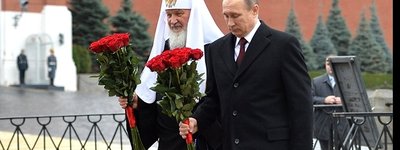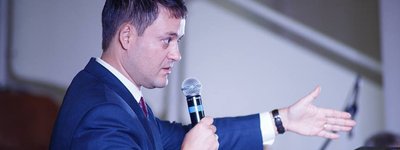Should the Church have secrets?
The announcement that the upcoming Synod of Bishops of the Ukrainian Greek-Catholic Church would be held in secret once again raises the question of whether secrecy in the Church is a good thing or not. In fact, one of the themes of the journalism conference to be held in Lviv on October 20 is “transparency” in the Church.
In today’s democratic age, we expect transparency in public institutions like government and the courts, because the people should have full access to information about how their affairs are decided. Many believe that the same goes for the Church: as an institution of the “people of God,” it, too, should be transparent. It should harbor no secrets. In the wake of revelations about cover-ups of sexual abuse in the Roman Catholic Church, the public cry for transparency has become more urgent. Last year, as I was discussing the synod of bishops that elected Sviatoslav (Shevchuk) as head of the UGCC with a television journalist, she criticized the secrecy that seemed to surround such Church events.
Yet secrecy seems to be part of the history and tradition of the Church. And even the most democratic states have their secrets. The American Constitutional Convention of 1787 was held behind closed doors and windows (despite the heat of a Philadelphia summer), under armed guard. It was felt that revealing the deliberations of the colonial delegates, who supported a variety of governmental schemes including monarchy, might undermine popular support for the constitutional order that was finally decided upon. In fact, the “deliberative privilege” has remained a fixture of American law, guaranteeing the freedom of an agency to consider a broad spectrum of policy alternatives without fear that the contents of its discussions might later be used to weaken its ultimate decision. In the church context, this rationale is illustrated by the case of Pope Paul VI’s encyclical “Humanae Vitae.” In formulating the encyclical, the pope rejected the findings of a special commission in favor of the arguments advanced by the future pope Karol Wojtyla. Critics of the encyclical have since exploited this fact to argue that the pope ignored expert advice.
One might object that in this regard, the state should not be equated with the Church. Indeed, they are different. For a state, the constant public questioning of even fundamental principles can be invigorating. For the Church, it is demoralizing.
States practice secrecy in various contexts. In wartime there are military secrets. These are necessary to protect the warring state as well as its soldiers. And in peacetime, the identities of agents of the intelligence services must be protected. Otherwise, the state cannot effectively protect itself and its citizens – not to mention the agents themselves -- from their enemies. National security information may also contain the secrets of other states with which the government in question has relations. This was shown by the affair of Julian Assange and his Wikileaks. And while many took satisfaction in the leaking of U.S. Ambassador Tefft’s communication of 8 August 2008 to the State Department, which contradicted the Russian claim that Georgia had begun the war – and which has been vindicated by Vladimir Putin’s recent admission -- such leaks can also have grave human consequences.
Ordinary citizens, too, can be harmed by the violation of secrecy. In the information age, the importance of confidentiality of personally identifiable data has become obvious. Anyone can become a victim of cyber-crime or other illegal activity based on the availability of confidential information; hence, the need for secrecy. The tradition of secrecy for the protection of individuals is well established in democracies: take, for example, the secret ballot, or the secrecy of federal grand jury proceedings in the United States.
But electoral and judicial systems are attributes of the state, which operates on the basis of power. Some would argue that the Church should have nothing to do with power. They want her to maintain her apostolic purity, with no hierarchical structures and no need to control information. Surely, they argue, Jesus did not envision the Roman Curia, the Inquisition, the Index of Prohibited Books, the Syllabus of Errors, or even the Eastern Congregation. Surely the primitive Church had no need of closed tribunals or vows of silence.
But such a vision of the Church requires us to excise from the New Testament the founding of the Church by Jesus’ commission to Peter, and the beginnings of the Church’s division of labor and establishment of a hierarchy of authority and responsibility in the Acts of the Apostles. The fact is that the Church is an institution. And in the real world, both institutions and their individual members have enemies. An institution like the state or the Church has a duty to protect its members – its citizens or its faithful, respectively. Information is a powerful tool that can be used against them, as well as against the institution itself. Hence, in some cases information must be protected. The catacomb Church of Roman times, as well as that of Soviet Ukrainian times, had to maintain secrecy in order to survive.
Perhaps the prime example of secrecy in the Church is the papal conclave. The rationale is the same as for grand jury proceedings: to avoid outside influence and protect individuals’ right to speak freely. If a cardinal knows that his vote will be reported to certain political forces outside the Church, and if those forces know that he knows this, they may be in a position to threaten him and thus influence the vote. Rumors of “bugs” in papal conclaves point to the importance of this safeguard. Moreover, in the Church, as in the state, secrecy is also practiced to protect ordinary individuals. The seal of confession is an obvious case.
How, then, do we distinguish those instances where secrecy is necessary from those where it is abused? Sometimes it is a matter of knowing when the boundary between Church and State is crossed. In some cases of alleged sexual abuse of minors by priests, it was felt necessary to protect the accused until the Church had ascertained his guilt. But it was apparently overlooked that a credible accusation of this type of offense has implications in the realm of the state as well: namely, in criminal law. Moreover, in some cases secrecy was invoked not just to protect a possibly innocent accused, but to cover up an affair that might harm the reputation of the Church – and then to cover up the cover-up. In the process, the rights of the victim were overlooked. While harming the Church’s reputation poses dangers to the salvation of souls, ironically, the news of the cover-ups proved even more harmful to the faith of Catholics than the news of the initial abuses. And the perception that the reputation of Church and hierarchy was deemed more important than the innocence of children – although certainly false – has taken firm hold of the public mind.
Less sensational, but important to the laity of the Ukrainian Greek-Catholic Church, is the matter of episcopal nominations for eparchies outside the homeland. The procedure, which enjoins the maintenance of secrecy, is set out in canon law (CCEO canon 149). In the past, Ukrainian laymen (particularly members of the Patriarchal movement) objected to the opaqueness of the process, especially when they disliked the result. Here, the demand for pubic transparency must be balanced with the necessity of forestalling undue pressure. While the Ukrainian activist laity could certainly be regarded as a pressure group, they pointed to the dangers of pressures emanating from curial circles inimical to their Church. Transparency in the nominating process might have revealed the sources, or at least the vectors, of such pressures. But it might have allowed other pressures to come to bear.
Secrecy, then, is a necessary but dangerous tool. It is not evil in itself. Everything depends on how we use it.










